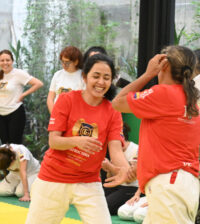- Belgium comes to Yamashita Park
- Residential Villa in Phuket Entices Remote Workers With Long-Stay Rates
- Rare pieces of French glass art at the Mirai Museum of Art
- Feast on fresh fish and seafood at the 2024 ‘Sakana’ Festival
- Would you like to ride in a Louis Vuitton gondola lift?
- Naked Snow Aquarium
- Festive lights at Yomiuriland will get you feeling the holiday vibes
Essential Questions When Choosing an International Preschool

One of the biggest decisions a family has to make when arriving in Tokyo is choosing a school. Given that many people are away from any set network of friends or family, school often provides the very first entree into a community within the city.
Therefore, choosing a school is not only important for the well-being of your child/children but also important for fostering connections within Tokyo.
As an international preschool educator and owner, I get to help many different types of families navigate the important decision of selecting an international preschool. I also know, having been the Director of preschools in both South Africa and Australia, that there are all kinds of schools to choose from. Some parents confess that they don’t always know what to ask when visiting a school – especially in a new country with perhaps a different set of standards from back home. And while every family will have questions that are important to them personally, I encourage new parents to hit on the Essential Five questions below to get a better understanding of the school and its dedication to excellence:
1. School philosophy and implementation. The foundation for the educational experience should lie in the school’s philosophy. As a parent, you can determine which philosophy matches best to your own vision for your child/children’s education. It’s important to understand these principles, but also to see how they are incorporated into the actual schooling and practice. Ask about the guiding philosophy of the school, and how that philosophy comes to life in the classroom on a day-to-day basis.
2. Teacher background. The more and more we learn about the development of children during their early years, the more we realize how much early education can foster their future success. The early years are particularly important for cognitive, emotional and social development. Teachers play a critical role in tapping into young minds to help them thrive. As an educator and administrator, I firmly believe that teachers must be trained in early education to be trusted to do this challenging job well. Ask what the qualifications are for the teachers – from the teaching assistant to head teacher.
3. Teacher/administrator turnover. While international schools can attract teachers with wander lust, a school that cares for its people – and gives them the right opportunities to grow and succeed – should be able to retain them for a significant stretch of time. Simply put, too much turnover indicates unrest at a school that ultimately affects the children. Ask how long the head of the school/teachers in your child’s potential classroom have been at the school. Don’t be afraid to inquire into why there were departures and listen carefully to the responses.
4. Accreditation and affiliations. This is particularly important in many international settings where schools operate outside of the country’s governmental jurisdiction. While this can provide flexibility as a school, it also means that the usual checks and balances aren’t in place. One way to ensure a school’s standards is to look at its accreditations and/or its affiliations. To be accepted into many of these organizations, schools are required to demonstrate that they are committed to excellence (e.g. providing significant staff training, have certain policies in place). Ask about the school’s accreditations and affiliations and what the requirements are for achieving them.
5. Communication. One of the best ways to feel comfortable with a school and a child’s experience is to understand it. This becomes even increasingly true in an International community where many of the parents aren’t native English speakers. To bring a diverse group together, a school must be prepared to communicate with its school community through a variety of mediums and on a regular basis. It should not be unusual, for example. for a school to send daily e-journals of life in the classroom as a way to keep parents informed as well as well as providing a conversation starter with their children. Ask how the teachers keep parents informed of the classroom life; how they discuss child performance; and how accessible administrators are to parent questions.
Shelley Sacks is an Educator and Owner of Ohana International Preschool: www.school-in-tokyo.com Check out how the school’s play-based programming helps to develop the whole child – intellectually, emotionally and physically.


















